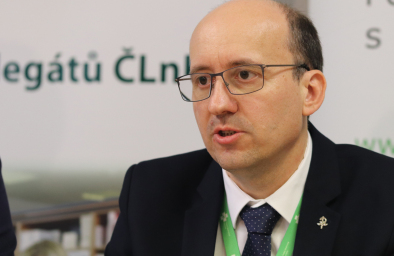Although prevention is the focal point of population’s health, prevention funds of health insurance companies represent only a fraction of the finances meant for treatment. To make things worse, the contributions of some health insurance companies lack the character of preventive measures – instead of supporting the health of their clients, they have the objective of gaining new ones. According to Deputy Director for Client Services of the General Health Insurance Company Ivan Duškov, the opposite approach should be implemented: finances for prevention should be greater and preventive programmes should be selected so that they truly are based on evidence and have proven benefits. Duškov stated the aforementioned at the international panel of the Zdravotnický deník Permanent Conference on Czech Healthcare, held on 22 July in Prague.
In the future, Ivan Duškov would like to base the General Health Insurance Company’s (VZP) prevention funds on the fact that, although medical treatment contributes to the overall improvement of the population by 30 per cent, 70 per cent is based on preventive measures.
“However, if you look at how prevention funds are set up, the opposite is true, or, there are even less funds available, respectively. The Public Health Insurance Act allows us to create a prevention fund from 0.3 per cent of the general fund. The question is whether this can be changed in future, allowing us to support evidence-based preventive measures to a greater degree,” Ivan Duškov pointed out. Though about CZK 200 billion from the VZP general fund go to treatment now, in 2019 (the last year not affected by the Covid-19 pandemic), contributions of only approximately half a billion were spent from prevention funds.

At the same time, it is a known fact that for every dollar invested into prevention, four dollars for treatment are saved. Sadly, this fact is not yet reflected in the public health insurance system to a great degree. In addition, not even the settings of prevention funds themselves are always optimal, and some health insurance companies do not use them for prevention or for the acquisition of new clients.
“A ten-thousand crown contribution for a watch with an EKG entices more than birthmark examinations. However, a professional perspective should prevail in the future. At the General Health Insurance Company, I would like to introduce the perspective of experts and the truly proven evidence-based character of each intervention to the outlines of each prevention fund programme. We have a lot of work ahead of us,” Duškov stated.
Vaccinations and health promotion of mothers and children are meaningful
What support is meaningful within prevention programmes? According to the McKenzie study, the most effective prevention programmes are vaccinations. “We see the nonsense discussions being held now. As the GHIC, we are exposed to pressure because we dare to send personalised letters to our clients asking them to consider getting the Covid-19 vaccination, which is effective and safe. Now we are facing harsh criticism because the letter cost CZK 15 per client. However, a day of hospitalisation in the Intensive Care Unit costs CZK 60,000,” Ivan Duškov observed.
Aside from vaccinations, health promotion of mothers, long-term nursing, and developing healthy habits in children is important. Habits that remain for the rest of one’s life develop throughout childhood and adolescence: if a child becomes used to brushing their teeth from when they are little, it becomes a matter of course for the rest of their lives.
Mohlo by vás zajímat

“And if one develops a set of habits through education or motivation, they will, for example, attend their regular preventive check-ups. On the contrary, changing a forty-year-old man’s attitudes and behaviours when they live a certain lifestyle is a rather difficult task. Of course, where there is a will, there is a way,” Ivan Duškov pointed out.
Duškov believes the principle of harm reduction to also be central in terms of both tobacco and alcohol.
We are not ready for penalties
Since efforts to implement preventive measures have not been very successful in the Czech Republic, some debate whether penalties for undesirable behaviour should be introduced in addition to a reward system.
“But be careful here. In the Czech Republic, the thirty-crown regulatory fee won the election twice for a certain political party. If we were to have said then that we would enforce greater taxes on obese people or on people engaging in what we consider to be toxic behaviour, then I would not last in my position as Deputy Director for long. I therefore think that although the gentler path of motivation and education is more difficult in terms of time and finances, it is the correct path in our context,” Ivan Duškov concluded.

Michaela Koubová







